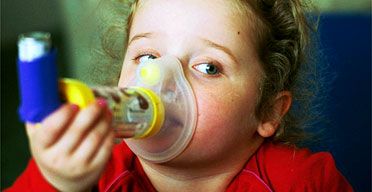Article
Call for Change in Recommendations Concerning Acetaminophen-Asthma Link
Author(s):
A recently published paper in the medical journal Pediatrics argues that there is finally strong enough evidence for doctors to recommend that infants and children who have asthma or are at risk for the disease avoid acetaminophen.

Over the last 30 years, asthma rates have sharply increased across the globe, and while there was uncertainty for a time as to what caused this rise, more than 20 studies have found substantial evidence linking acetaminophen, a popular painkiller, to increased rates of asthma in children. A recently published paper in the medical journal Pediatrics argues that there is finally strong enough evidence for doctors to recommend that infants and children who have asthma or are at risk for the disease avoid acetaminophen.
“As a pediatric pulmonologist, I am entrusted with the care of many asthmatic children and, at some level, with the respiratory health of all children in my area,” Dr. John T. McBride, a pediatrician at Akron Children’s Hospital in Ohio, writes in his paper. “Given this role, I must decide when and how to act on the possibility that acetaminophen is detrimental to asthmatic children. Considering currently available data, I now recommend that any child with asthma or a family history of asthma avoid using acetaminophen.”
The rise in asthma began roughly around the same time that doctors began prescribing acetaminophen to children with fevers instead of aspirin, as aspirin had recently been linked to Reye’s syndrome in children, according to an article published in The New York Times. Dr. Arthur Varner, then a fellow in the immunology training program at the University of Wisconsin School of Medicine, first noted the possible association between acetaminophen and increased rates of asthma in children in a paper published in The Annals of Allergy and Asthma Immunology in 1998.
In November 2011, McBride published his paper which addressed Varner’s hypothesis, as well as numerous studies which have backed up this claim.
One such study McBride notes, which was published in The Lancet in 2008, analyzed data collected on 205,487 children between the ages of 6 and 7 from 31 countries as part of the International Study of Asthma and Allergies in Childhood (ISAAC study). The study found a 50% increase in risk of developing asthma in children who were given acetaminophen during the first year of life in comparison with children who were not given the medicine. They also found that the risk of asthma increased with use; children who took acetaminophen at least once per month suffered a threefold increase of risk for developing asthma.
Thus far, there has only been one randomized controlled trial concerning the connection between acetaminophen and asthma, which was published in Pediatrics in 2002. Researchers at Boston University School of Medicine randomly selected 1,879 children with asthma to be given either acetaminophen or ibuprofen if they got a fever. They found that children who were given acetaminophen were more than twice as likely to see a doctor later on for symptoms related to asthma than children who were given ibuprofen.
In 2009, a meta-analysis was published in Chest which determined that children who had taken acetaminophen in the past year had almost double the risk of wheezing in comparison with children who had not taken the drug.
Even so, lead author of the study, Mahyar Etminan, a pharmacoepidemiologist at the University of British Columbia, said that while these results seem indicative of a link between acetaminophen and asthma, there are other factors to consider. “Children who take acetaminophen are usually getting it for fever control,” Etminan said, “and they get fevers because they have viral infections, which on their own are associated with developing asthma later in life.”
McBride acknowledged such possibilities in his paper, stating “there remains a possibility that confounding variables might explain some or all of the association between acetaminophen and asthma. For this reason we need further studies.”
“At present, however,” he continued, “I need further studies not to prove that acetaminophen is dangerous but, rather, to prove that it is safe. Until such evidence is forthcoming, I will recommend avoidance of acetaminophen by all children with asthma or those at risk for asthma and will work to make patients, parents, and primary care providers aware of the possibility that acetaminophen is detrimental to children with asthma.”




